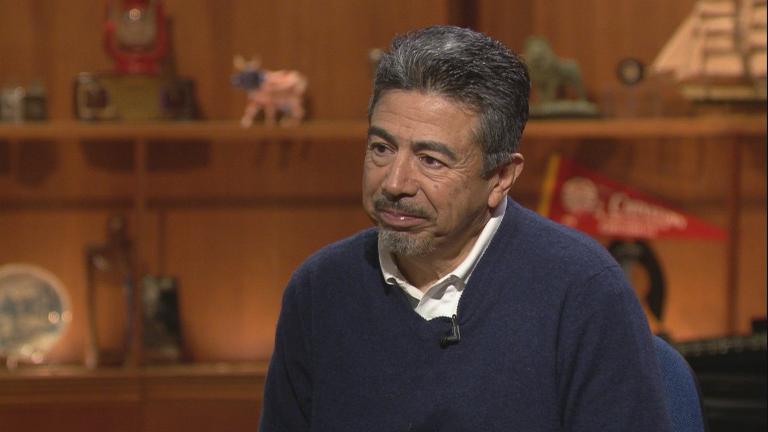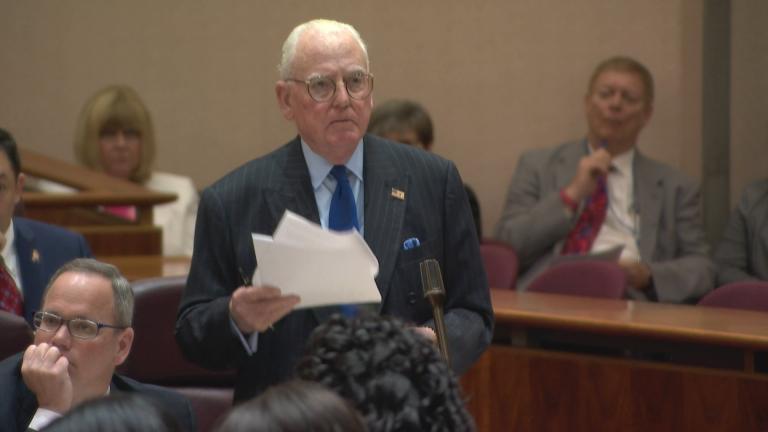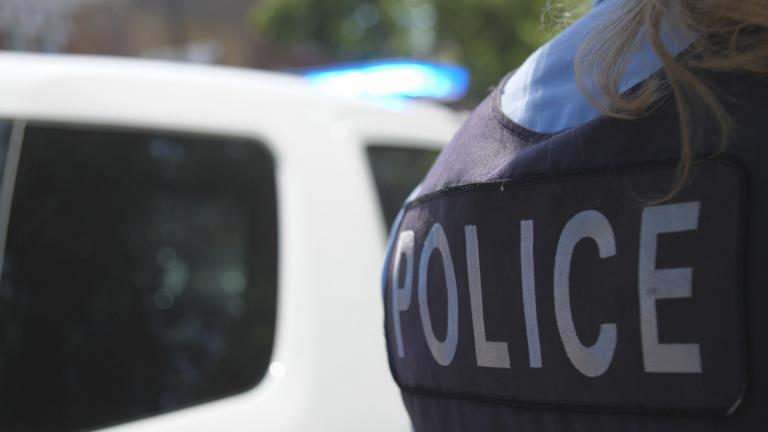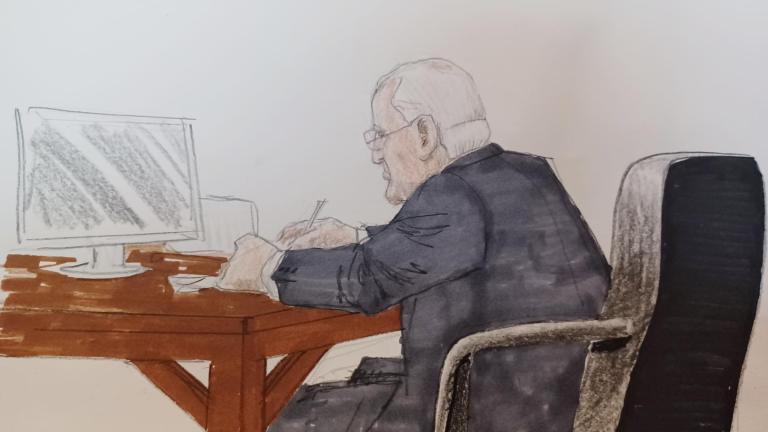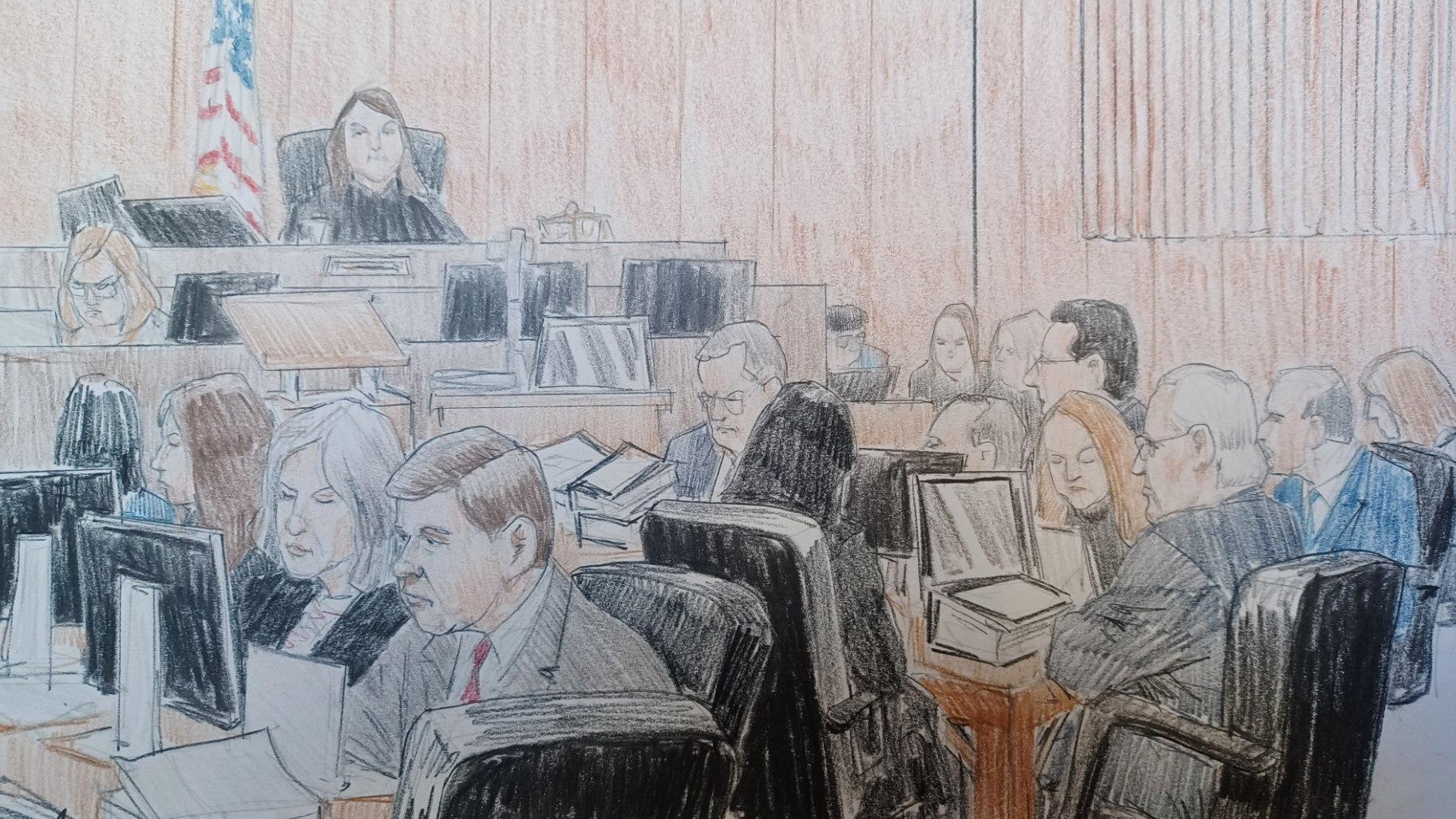 Lawyers and defendants in the Ed Burke trial appear before Judge Virgina Kendall on Nov. 30, 2023. (WTTW News)
Lawyers and defendants in the Ed Burke trial appear before Judge Virgina Kendall on Nov. 30, 2023. (WTTW News)
Lawyers for ex-Ald. Edward Burke on Friday continued to hammer disgraced former Ald. Danny Solis during closing arguments in the landmark corruption trial, calling Solis a “failure” as a government informant and a “con man.”
Burke’s attorney Joseph Duffy began his closing arguments on behalf of the man who once ruled City Hall with an iron fist on Thursday by blasting prosecutors for failing to call Solis as a witness, urging the jury to question the reason for that decision. He spent much of Friday morning hammering that point home.
If the nine men and three women use their common sense, the obvious conclusion is that prosecutors decided that “Danny Solis was a failure,” Duffy said.
And that failure forced federal investigators to scramble, “searching for something to grab” to justify their probe of Burke.
After a 30-month investigation, Solis “had nothing” to prove that Burke held up the $800 million renovation of the Old Post Office, the massive building that straddles the Eisenhower Expressway at the edge of the Loop, until the developer hired his private law firm, Duffy said.
On the stand as the sole witness called by Burke in his defense, Solis acknowledged that he agreed to document conversations with Burke with audio and video recorders to avoid being prosecuted for taking bribes as the powerful chair of the Zoning Committee and other criminal offenses.
Duffy said jurors should not forget that Solis had a motive to help the FBI nail Burke.
“Solis is a con man,” Duffy said, his voice rising with indignation. “They wouldn’t even put him on the stand.”
By contrast, Duffy portrayed Burke as a “good man” and a dedicated public servant who relished his ability to move the city’s bureaucracy and “thrived on connecting the right people.”
Burke is nothing like the caricature drawn by prosecutors, which depicts him as a “boogeyman” sowing fear wherever he went, Duffy said.
“Judge him on his actions, not some belief or his reputation or suspicion,” Duffy said, dismissing the government’s case as “noise.” “Judge him on what he did in this case. Please.”
Despite his love for Chicago, his family and God, Burke is not perfect, Duffy acknowledged.
“He has a temper,” Duffy said. “His ego emerges. None of those are crimes.”
Nor is “aggressive sales promotion,” Duffy said, acknowledging that the jury heard Burke urge Solis to “recommend the good firm of Klafter & Burke to do the tax work” for the developer in charge of the Old Post Office renovation and push the owners of a Burger King to hire his firm.
Duffy concluded his closing arguments by urging the jury to send Burke home to celebrate his 80th birthday on Dec. 29 with his family.
As Burke beamed and gave his attorney a thumbs-up, Assistant U.S. Attorney Susan McArthur objected.
When reviewing the scheme involving the Old Post Office, jurors should also question why prosecutors did not call Harry Skydell, who was leading efforts by the New York-based 601 West Companies to redevelop the Old Post Office, Duffy said. Skydell, like Burke, was “literally harassed” by Solis, who was frantic to help federal investigators.
“He was not called because he would not have supported the government’s case,” Duffy said.
Burke should be acquitted on all charges involving the Old Post Office because there is no evidence he traded official actions for legal work, Duffy said.
Nor did Burke work to hold up the approval of an $18 million subsidy and a tax break worth $100 million that the project needed, Duffy said. That was not possible, because the project was a high priority for former Mayor Rahm Emanuel. Burke’s defense team has portrayed Emanuel as the most powerful Chicago politician, not their client.
“He was always going to support Mayor Emanuel’s project,” Duffy said.
Burke is charged with 14 counts of racketeering, extortion and Racketeering charges — usually brought against members of the mob or street gangs — allege a pattern of corruption unknown to its victims. He is being tried alongside Pete Andrews, his longtime aide, and businessman Charles Cui.
The jury is likely to start deliberating early next week.
By mid-morning, Duffy had turned his attention to another criminal scheme Burke is charged with orchestrating, this one involving a similar scheme, this one involving the owners of a Burger King in Burke’s 14th Ward.
In 2017, the owners of the fast-food joint needed city permits to renovate the eatery at 4060 S. Pulaski Road. Under the City Council’s decades-long tradition of aldermanic prerogative, they needed Burke’s sign-off — and prosecutors say Burke explicitly withheld that permission until the owners hired his private law firm to appeal their property taxes.
Much of the testimony about the alleged Burger King scheme centered on whether the restaurant’s owner, Houston-based TriCity Foods, needed a driveway permit before the company could proceed with planned renovation. Prosecutors have alleged Burke exploited the firm’s need for the driveway permit to extort the firm’s owners, Shoukat and Zohaib Dhanani.
Duffy blamed the father-and-son Texas businessmen for any delays that the project endured, and said they hired a “goofy” and incompetent architect, and said Burke was acting as a “good steward of the ward” when he demanded they get a permit for their driveway on to 40th Street.
Duffy focused much of his closing statement on an October call between Burke and Andrews, which captured Burke’s reaction when he realized the restaurant renovation was underway. The alderperson his aide to remind him about what the Burger King’s owners had requested from the city.
“What was the issue? Why was I able to hold that up? What did they need from me?” Burke said on a wiretapped phone conversation with Andrews, who replied that the owners needed their “driveway permits and everything signed off on.”
“All right, I’ll play as hard ball as I can,” Andrews replied, according to the recording.
All Burke did was enforce the city’s laws, Duffy said.
Andrews faces five charges, including attempted extortion and lying to a federal agent.
Patrick Blegen, Andrews’ defense attorney, said Andrews was only doing his job when he demanded the Dhananis get a driveway permit, and had no knowledge of Burke’s efforts to sign the Texas businesspeople up as clients of his law firm.
Blegen said Andrews did not lie to FBI agents when he said he did not know Shoukat and Zohaib Dhanani, but did not recognize them after spending just 24 minutes with them several months before being questioned as part of the probe into Burke, his longtime boss.
In addition, there is no evidence that Burke threatened or intimidated either Shoukat or Zohaib Dhanani when he met with them, Duffy said, emphasizing that neither man called the FBI to report that they had been shaken down.
However, Shoukat Dhanani testified that Burke told him he’d like to “get some of his law business” when he met with Burke after inquiring about why the building permit the renovation project needed had yet to get Burke’s approval.
Zohaib Dhanani testified previously that Burke explicitly linked the success of their permit application with their decision to hire his law firm in a conversation that was recorded under a court-approved wiretap and played for the jury.
“We’re going to talk about the real estate tax representation and you’re gonna have somebody get in touch with me so we can expedite permits,” Burke said.
While Zohaib Dhanani testified that was inappropriate, he acknowledged he didn’t come to that conclusion until after speaking to FBI agents investigating Burke, Duffy said.
Burke is also charged with threatening to block a fee increase for the Field Museum in 2017 because officials didn’t agree to hire a friend’s daughter as an intern.
Burke was angry that museum officials did not consider Molly Gabinski, his goddaughter, for an internship. Gabinski is the daughter of former Ald. Terry Gabinski (32nd Ward), a longtime friend and colleague of Burke.
But Burke took no official action to retaliate against the museum, and did not demand a job for Gabinski, Duffy said. However, the jury saw evidence museum officials offered to interview her for a full-time job as they worked to placate an infuriated Burke and protect the planned fee increase.
“He asked for nothing,” Duffy said.
In fact, Richard Lariviere, then the president of the museum, sent Burke a warm note after he was charged by federal prosecutors.
“What victim sends a note to the guy who extorted him?” Duffy asked, his voice rising with indignation.
The final criminal scheme Burke is charged with crafting involves Cui, a businessman who transformed a long-vacant Six Corners bank building into a Binny’s Beverage Depot, Culver’s and gym.
According to federal prosecutors, Cui went to Burke when city officials denied his request for a large pole sign outside the former bank building he redeveloped. Burke offered to help Cui, if he hired Klafter & Burke. Cui did, according to evidence shown to the jury.
The pole sign was never erected, and Cui is also charged with lying to FBI agents.
Duffy, Burke’s defense attorney, said the former alderperson did nothing wrong when he pressed city officials to look into why a request for a pole sign on the Far Northwest Side had been denied after the developer hired Burke’s private law firm.
Burke often asked city officials to look into issues for people who contacted his office, Duffy said, and never entered into a “meeting of the minds” with Cui to take a specific action if the businessman hired the former alderperson.
Cui’s attorney, Tinos Diamantatos, said his client did not intend to bribe Burke. Instead, he was looking for legal representation — nothing more, and nothing less.
Cui and Burke never even met about the pole sign, Diamantatos said.
If Burke was as powerful as prosecutors believed, the pole sign would be sitting outside 4901 W. Irving Park Road today, Diamantatos said.
“Where’s the beef?” Diamantatos asked, prompting laughter from observers in the gallery old enough to remember the Wendy’s commercial from the 1980s. “You’ve gotten nothing but bun from the government so far.”
As he spoke, he displayed a picture of an empty hamburger bun.
Diamantatos suggested that Cui was “collateral damage” in federal investigators’ zeal to get Burke.
After 15 hours of closing statements, Assistant U.S. Attorney Sarah Streicker wasted little time in attacking the arguments made by Burke’s attorneys during the government’s rebuttal arguments, telling the jury that they were trying to distract them from the facts.
"Burke’s crimes are against people who deserve an honest and clean government," Streicker said.
Streicker said there was no need for prosecutors to call Solis, because every damning interaction he had with Burke was recorded.
Streicker reminded the jury of Burke’s turns of phrase have already become an indelible part of Chicago’s long history of political corruption.
“So, did we, uh, land the tuna?” Burke asked Solis. “If we land the tuna there certainly will be a day of accounting, you can count on that.”
Burke’s own words are evidence of his intent, Streicker said.
“If we’re not signed up, we’re not going to do heavy lifting,” Burke said. “The cash register has not rung yet.”
In another conversation, Burke told Solis the New York-based developer could “go f--- himself” if he thought Burke would help him win a subsidy and a tax break.
Burke was not recorded expressing concern about the residents of his 14th Ward, or the people of Chicago, Streicker said.
“He did not say those things,” Streicker said. “What he does say over and over and over again is this expression of concern over benefitting himself.”
Streicker emphasized that Burke’s position of power in his ward and the City Council gave him the ability to apply pressure on others for his own benefit.
“As chair of the Finance Committee, Burke held power and influence. That was Burke’s sphere, his committee and his ward and he leveraged that for personal gain,” Streicker said.
The jury will start deliberating sometime on Monday, after what is set to be a complicated set of instructions by U.S. District Court Judge Virginia Kendall. If a verdict is not reached by Dec. 22, deliberations will be suspended from Dec. 25 to Dec. 29, and resume Jan. 3.
Matt Masterson contributed to this report.
Contact Heather Cherone: @HeatherCherone | [email protected] | (773) 569-1863


